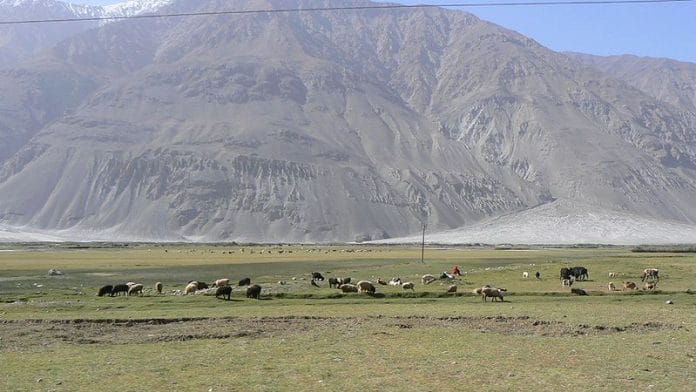Thank you dear subscribers, we are overwhelmed with your response
Your Turn is a unique section from ThePrint featuring points of view from its subscribers. If you are a subscriber, have a point of view, please send it to us. If not, do subscribe here: https://theprint.in/subscribe/
The Peaceful Assembly and Public Order Ordinance 2024 in Azad Jammu and Kashmir (AJK) has sparked significant controversy and protests. Enacted as a presidential ordinance, the law imposes strict regulations on public gatherings, requiring organizers to seek prior approval from district magistrates at least 48 hours in advance. Authorities claim the law is designed to safeguard public order, prevent disruptions, and protect essential services, such as healthcare and transportation.
The key provisions of the Ordinance 2024 are:
- Mandatory Permission: Organizers must apply in writing to the District Magistrate at least 48 hours before any public gathering. Applications can be rejected or delayed without explicit justification, sparking concerns about arbitrary decision-making.
- Appeal Mechanism: If an application is rejected, organizers can appeal to the Divisional Commissioner, who must provide a decision within 15 days. Further appeals can be made to the AJK Home Secretary.
- Severe Penalties: Violators face imprisonment of up to three years for holding unauthorized gatherings. Repeat offenses may lead to up to ten years of rigorous imprisonment, signaling harsh measures against dissent.
- Prohibited Actions: Public gatherings that block roads, disrupt essential services, or damage property are explicitly banned. Law enforcement can act immediately to disperse such assemblies.
However, many Kashmiris and diaspora groups have criticized the ordinance, viewing it as a tool to suppress dissent. Protests have erupted in various cities, with demonstrators arguing that the law infringes on constitutional rights, such as freedom of assembly and speech guaranteed by the Interim Constitution of 1974. Several incidents of unrest have been reported, including violent clashes in Kotli, where police used tear gas and batons to disperse protesters. At least three civilians were killed during confrontations, escalating tensions in the region.
Legal challenges to the ordinance have also emerged, with activists and legal experts contending that it contradicts constitutional protections. Despite these objections, the AJK High Court upheld the ordinance, deeming the restrictions “reasonable.” The matter is now pending appeal in the AJK Supreme Court.
The situation reflects broader concerns about governance in Pakistan-administered Kashmir, where local authorities and civil society frequently clash over issues of autonomy and human rights. The law has become a rallying point for political groups, such as the Jammu Kashmir Liberation Front (JKLF), which demand its repeal and greater freedoms for the people of AJK.
The law has triggered widespread protests in major towns like Rawalakot, Muzaffarabad, and Kotli. These demonstrations have often turned violent, with reports of clashes between protesters and police. At least three civilian deaths during protests in Kotli have intensified public outrage. Protesters, led by groups such as the Jammu Kashmir Liberation Front (JKLF), argue that the ordinance suppresses freedom of assembly and targets political dissent under the guise of public order.
Students, lawyers, and civil society activists have also joined the protests. Many see the law as part of a broader strategy to centralize control and stifle opposition in the politically volatile region. The opposition has filed multiple legal challenges, asserting that the ordinance violates AJK’s Interim Constitution of 1974, which guarantees fundamental rights.
The ordinance comes amid heightened activism by the Kashmiri diaspora, particularly in the context of ongoing disputes over the region’s political status. Advocacy groups abroad have amplified concerns about the law, framing it as part of Pakistan’s broader strategy to suppress dissent in its administered territories. This has sparked debates over the role of international human rights organizations and diaspora communities in addressing governance issues in AJK.
The ordinance’s penalties, including imprisonment for up to 10 years for repeat offenses, have been described as disproportionate and draconian. Activists and political groups see the ordinance as a strategic move to suppress dissent, particularly among opposition parties.
The ordinance has also raised international concerns. Kashmiri diaspora groups have organized rallies in the UK, US, and Canada, urging international human rights organizations to pressure Pakistan to repeal the law. Amnesty International and Human Rights Watch have criticized the ordinance, labeling it a restriction on peaceful assembly and calling for an independent investigation into the use of force during protests.
The ordinance’s introduction coincides with broader geopolitical dynamics in the region. Pakistan has faced scrutiny over its governance in AJK, with accusations of curbing political freedoms to maintain control. The law has intensified debates about AJK’s political autonomy and the role of federal oversight. Critics argue that such measures undermine Pakistan’s narrative of championing Kashmiri self-determination internationally, particularly in light of its criticism of India’s policies in Jammu and Kashmir.
International advocacy groups and diaspora communities have amplified these critiques, framing the ordinance as part of a systematic suppression of Kashmiri voices across both Indian- and Pakistan-administered territories. The protests have sparked calls for a renewed international focus on the region’s governance and human rights conditions.
The Peaceful Assembly and Public Order Ordinance 2024 has emerged as a contentious law with significant political, legal, and human rights implications. While the AJK government defends it as a necessary measure for public order, critics view it as an overreach aimed at stifling dissent. The resulting protests, legal challenges, and international attention have underscored the ordinance’s broader impact on governance and autonomy in Pakistan-administered Kashmir.
These pieces are being published as they have been received – they have not been edited/fact-checked by ThePrint


